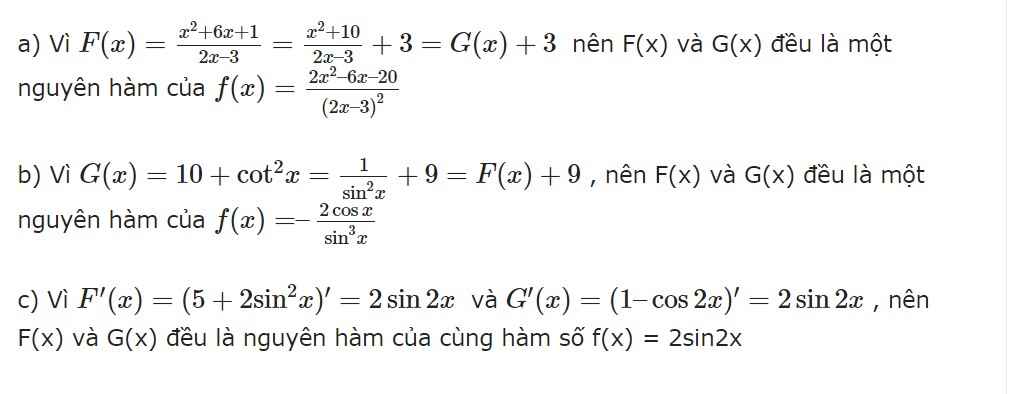Hãy nhập câu hỏi của bạn vào đây, nếu là tài khoản VIP, bạn sẽ được ưu tiên trả lời.

Biến đổi: ʃ\(\int\dfrac{1dx}{cosx\dfrac{\sqrt{2}}{2}\left(cosx-sinx\right)}=\int\dfrac{\sqrt{2}dx}{cos^2x\left(1-tanx\right)}=\int\dfrac{\sqrt{2}d\left(tanx\right)}{1-tanx}=-\sqrt{2}\ln trituyetdoi\left(1-tanx\right)\)
https://www.youtube.com/channel/UCzeAuHrGhk8hUszunoNtayw
Luyện Thi THPT Quốc Gia miễn phí 100%

a:
ĐKXĐ: x+1>0 và x>0
=>x>0
=>\(log_2\left(x^2+x\right)=1\)
=>x^2+x=2
=>x^2+x-2=0
=>(x+2)(x-1)=0
=>x=1(nhận) hoặc x=-2(loại)
c: ĐKXĐ: x-1>0 và x-2>0
=>x>2
\(PT\Leftrightarrow log_2\left(x^2-3x+2\right)=3\)
=>\(\Leftrightarrow x^2-3x+2=8\)
=>x^2-3x-6=0
=>\(\left[{}\begin{matrix}x=\dfrac{3+\sqrt{33}}{2}\left(nhận\right)\\x=\dfrac{3-\sqrt{33}}{2}\left(loại\right)\end{matrix}\right.\)

Để kiểm tra một hàm F(x) có phải là một nguyên hàm của f(x) không thì ta chỉ cần kiểm tra F'(x) có bằng f(x) không?
a) \(F\left(x\right)\) là hằng số nên \(F'\left(x\right)=0\ne f\left(x\right)\)
b) \(G'\left(x\right)=2.\dfrac{1}{2}.\dfrac{1}{\cos^2x}=1+\tan^2x\)
c) \(H'\left(x\right)=\dfrac{\cos x}{1+\sin x}\)
d) \(K'\left(x\right)=-2.\dfrac{-\left(\dfrac{1}{2}.\dfrac{1}{\cos^2\dfrac{x}{2}}\right)}{\left(1+\tan\dfrac{x}{2}\right)^2}=\dfrac{\dfrac{1}{\cos^2\dfrac{x}{2}}}{\left(\dfrac{\cos\dfrac{x}{2}+\sin\dfrac{x}{2}}{\cos\dfrac{x}{2}}\right)^2}\)
\(=\dfrac{1}{\left(\cos\dfrac{x}{2}+\sin\dfrac{x}{2}\right)^2}=\dfrac{1}{1+2\cos\dfrac{x}{2}\sin\dfrac{x}{2}}\)
\(=\dfrac{1}{1+\sin x}\)
Vậy hàm số K(x) là một nguyên hàm của f(x).
